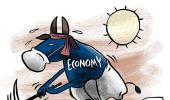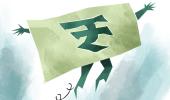Amid fast-depleting forex reserves, the Finance Ministry on Wednesday signalled that it was not in favour of selling the dollar to defend any particular level of the rupee.

“Let it (rupee) reach whatever levels it has to reach. We can’t fritter away reserves on defending some artificial, imaginary rate of exchange,” a senior finance ministry official told Business Standard.
Forex reserves declined to a near two-year low of $545.65 billion as on September 16, down $85.88 billion from the level that existed on February 25, a day after Russia invaded Ukraine.
Though current reserves are enough for nine months of imports, they were enough to cover 15 months of imports a year ago.
Finance Minister Nirmala Sitharaman on Monday said the RBI has used nearly $75 billion to stem fluctuations and volatility in the rupee-dollar exchange rate.
“The RBI is not aiming at fixing the exchange rate; the government doesn’t believe in it.
"The Indian rupee and its exchange rate are also left to the market to decide,” she said.
The rupee breached the crucial 81-mark versus the dollar intraday last Friday as the greenback climbed to a 20-year high, backed by the Federal Reserve's 75-basis point rate hike.
So far this calendar year, the rupee has declined by 8.2 per cent against the dollar, but still outperformed several EM currencies.
“It (rupee) should fall, otherwise the trade-rated exchange rate will become uncompetitive,” the official said.
The official added that nobody knows by how much the Fed shall further raise the interest rate, as part of its counterintuitive tightening.
“So these market-determined rates have to be accepted,” he said.
It is wrong to characterise the current phenomenon as “rupee fall”, the official said, just because of the rupee-dollar exchange rate.
“The rupee has appreciated against other currencies, such as the pound and the yen. It (dollar) just happens to be the reference rate,” he noted.
On the expanding current account deficit (CAD), which is expected to touch a nine-year high in the June quarter, the source said this would abate as oil prices have started to fall.
“I think CAD in the second quarter should be better than the first quarter,” he added.











